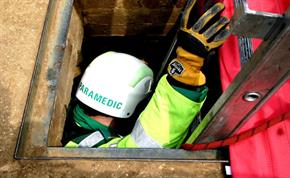
With the arrival of the national hazardous area response teams (HART) a few years ago ambulance service personnel are able, for the first time in history, to move into dangerous or hazardous environments and start given patients the care they need.
But when, and why, should you deploy the HART team?
Well, both the Melbourn and Great Notley teams have staff with the right training and PPE that can respond to a catastrophic incident not just in the east of England, but anywhere in the country.
But HART is not just in existence for the large jobs, it is here to support regular incidents which involve hazardous situations or where their equipment, like the Polaris vehicle (for getting to patients in difficult to reach areas like woods), or Rad-57 (for measuring the levels of carbon monoxide in a person’s body) will add value to the delivery of patient care.
The legal side of things
There have been incidents throughout the UK where HART skills have not been used to the detriment of patient care; we all remember the shootings in Cumbria in 2010, where Derrick Bird killed 12 people and injured many more. The ambulance service refused to commit resources because of the risk to staff, and so police and members of the public were left to treat patients. The subsequent report stated: “it is very unlikely that the police will be able to guarantee that the scene is safe, however, it would be reasonable for the public to expect the ambulance service to attend scenes where there is residual risk.”
Firearms cases are just one example, but HART has the training, capability and PPE to move forward into these kind of environments to start life-saving care – with or without the police.
So while the HART might not always at the scene of an incident quickly due to the geography within the region, it is important to ensure that managers request HART at the earliest opportunity – even if this means the team start their journey under normal road speed until the exact details of the incident are known. Each HART supervisor is always available by phone or airwave radio to provide advice and guidance prior to the team’s arrival.
We have a medical duty of care to patients whilst keeping our staff safe – you can read more about how HART fits into this in Deploying HART- the legal framework. All operational managers are asked to read this, and print and keep a copy where possible.